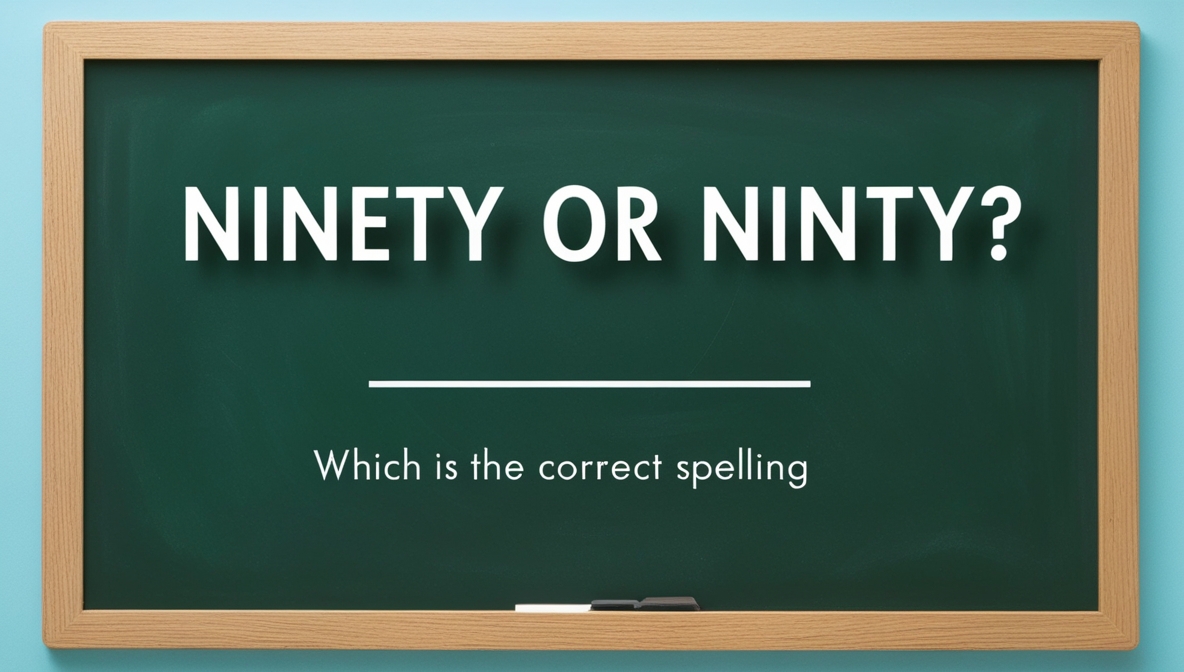In the vast expanse of the English language, certain words can trip us up, creating confusion even among the most seasoned writers and speakers. One such pair is “ninety” and “ninty.” While they may sound similar, only one is correct. In this article, we will explore the correct spelling, delve into scenarios where these terms may arise, and provide clarity on why it’s essential to get it right.
Understanding the Correct Spelling
The correct spelling is ninety. This word represents the number 90 and is derived from the combination of the word “nine” and the suffix “-ty,” which is used to denote multiples of ten.
On the other hand, ninty is a common misspelling. It does not appear in standard dictionaries and is generally considered incorrect in both written and spoken English.
The Importance of Accurate Spelling
Accurate spelling is crucial in communication. It not only enhances clarity but also reflects a level of professionalism and attention to detail. Using the wrong spelling can lead to misunderstandings or make one appear less credible. For instance, if you were to write “The event starts at ninty o’clock,” it could confuse your reader, who might wonder if “ninty” refers to a new concept or time.
Scenario 1: Formal Writing
Imagine you are drafting a formal letter to a local government office requesting funding for a community project. You write:
“We are seeking funding of ninety thousand dollars to improve our community park.”
In this context, using “ninety” accurately conveys the amount needed. If you had mistakenly written “ninty,” the recipient might question your attention to detail, which could undermine your request.
Scenario 2: Informal Communication
In a text message to a friend, you might say:
“I can’t believe we’re already ninety days into the new year!”
Here, the use of “ninety” is not just correct; it also adds to the conversational tone. If you wrote “ninty,” it may seem like a simple typo, but repeated mistakes like this could lead to your friend questioning your grasp of basic spelling.
Common Confusions in Spelling
Why do people often confuse “ninety” with “ninty”? One reason could be the phonetic similarity. When spoken quickly, the two words sound alike, which might lead to the erroneous spelling. Additionally, the English language has its fair share of irregularities, and many people learn through context rather than explicit instruction.
Scenario 3: Educational Settings
Consider a classroom environment where a teacher is discussing numbers. A student might ask:
“Is it ninty or ninety?”
This question highlights the confusion surrounding the term. A knowledgeable teacher would seize this opportunity to clarify the correct spelling and explain that “ninety” is the only acceptable form.
The Role of Context
Context plays a significant role in understanding and using the correct spelling. Whether you’re writing a novel, drafting an email, or texting a friend, the surrounding words can provide hints about the appropriate spelling.
Scenario 4: Creative Writing
A novelist might write:
“The clock struck ninety times, echoing through the empty halls.”
In this imaginative context, “ninety” not only fits the narrative but also enriches the story. If the author had used “ninty,” it would detract from the immersion, pulling readers out of the experience.
Tips for Remembering the Correct Spelling
To avoid confusion in the future, consider these helpful tips:
- Break It Down: Remember that “ninety” is a combination of “nine” and “-ty.” Keeping this breakdown in mind can help you recall the correct spelling.
- Visual Cues: Visualize the word “ninety” written clearly in your mind. Associating it with images of the number can reinforce the spelling.
- Practice Makes Perfect: Regularly writing the word in different contexts can help solidify your understanding and ability to spell it correctly.
Why Spelling Matters
The impact of correct spelling extends beyond personal communication. In professional settings, such as business reports, marketing materials, and academic papers, spelling errors can have serious repercussions. They can lead to misinterpretations, affect the credibility of the author, and even impact business relationships.
Scenario 5: Business Communication
Imagine you’re preparing a presentation for potential investors. You state:
“Our projections indicate a growth of ninety percent in the next quarter.”
In this crucial moment, the correct spelling is vital. A misspelling could lead investors to doubt the accuracy of your data and projections.
Cultural Influences on Language
Language is constantly evolving, influenced by culture, technology, and social media. Words can change, and new forms can emerge, but the fundamentals, such as spelling, tend to remain consistent. While “ninty” may pop up occasionally in informal contexts, it remains a misspelling.
Conclusion: Clarity is Key
In conclusion, when it comes to the correct spelling of the number 90, the answer is clear: ninety is the only correct form. Missteps like “ninty” can lead to confusion and may impact how your message is received. By paying attention to detail and practicing good spelling habits, you can ensure that your communication is clear and professional.
As you navigate the world of language, remember that every word counts. So, the next time you encounter the number 90, confidently spell it as ninety, and watch your communication flourish!

